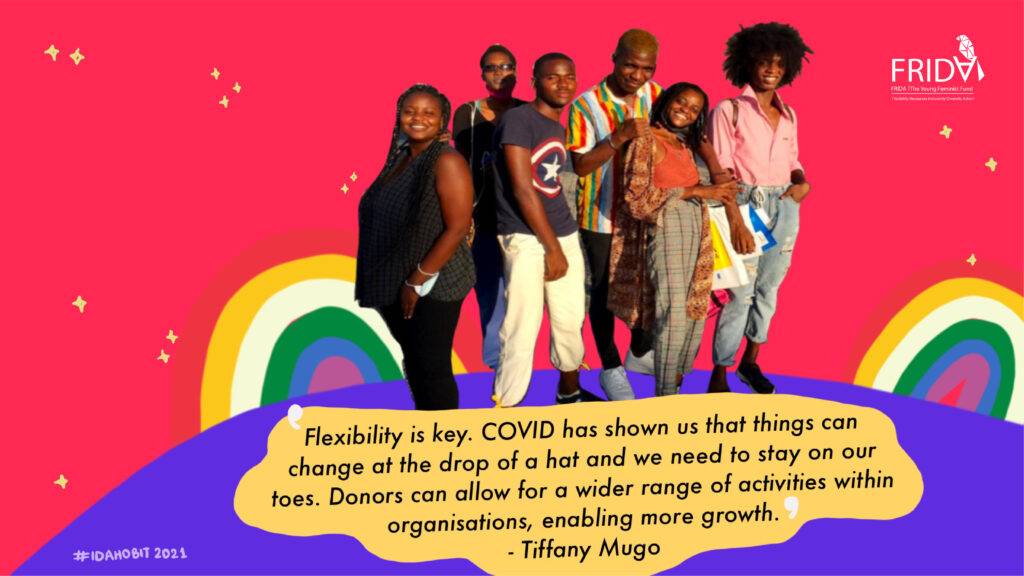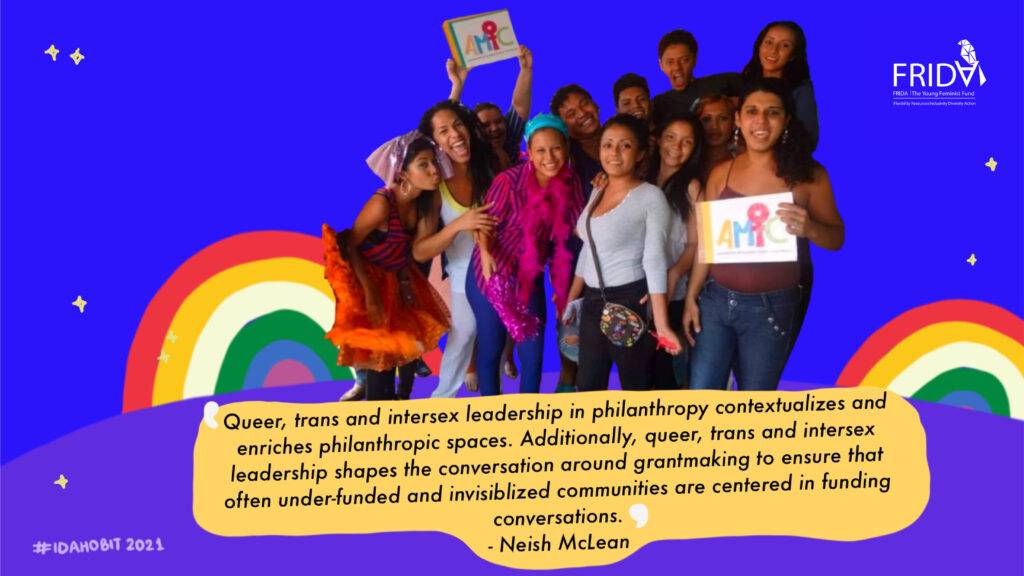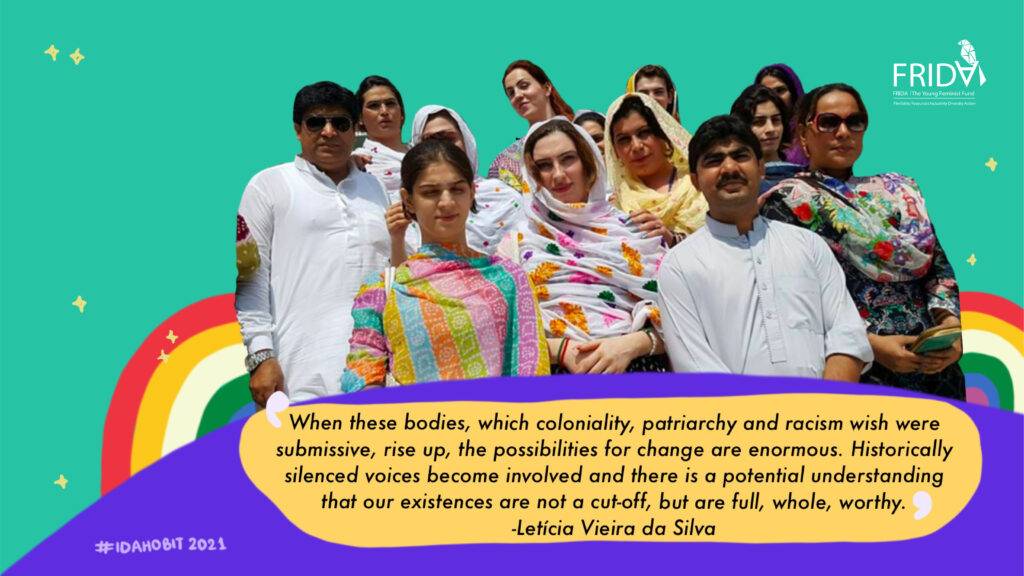A roundtablele dialogue–in two parts–among movement actors and philanthropists on LGBTQIA+ organizing, what philanthropy needs to do more and how we can mobilise together to rise above hate and continue building transnational solidarities.
On May 17 in recognition of International Day Against Homophobia, Biphobia and Transphobia (IDAHOBIT) we invited members of FRIDA community and peer grantmaking organizations for a roundtable where they engaged in answering some key prompts to help inspire these reflections. Part 1 tried to understand the specific challenges faced by LGBTQIA+ people and how COVID-19 has impacted the organizing they do. We continue the conversation on movement building led by LGBTQIA+ people in the second part of this roundtable dialogue. Part 2 reflects deeply on what philanthropy and donors can do to support and sustain movement building led by LGBTQIA+ people.
A note on participating interviewees:
- Di (D) is a queer feminist activist and researcher, who has been associated with organizing around LGBTQIA+ rights at the grassroots level.
- Tiffany Mugo (T) runs the sex positive platform HOLAAfrica! which looks at all things sex and sexuality within the African continent and beyond. She is a current board member at FRIDA.
- S is part of a FRIDA grantee partner from MENA region that works at the intersection between art and activism to elevate LGBTQIA+ voices and concerns.
- Mukasa (M) is a Senior Program Officer at International Trans Fund, a participatory grantmaking fund made up of trans activists and donors.
- Neish McLean (N) is Programs Consultant for the Caribbean region at Astraea Lesbian Foundation for Justice, the only philanthropic organization working exclusively to advance LGBTQIA+ human rights around the globe.
- Letícia Vieira da Silva (L) is a young feminist, LGBTQIA+, and antiracist activist from Brazil. She is also the Communities & Culture Officer at FRIDA.

How can donors better support your struggle and cause in the present moment?
D: We need to provide flexible and sustainable support for groups of LGBTQIA+ activists and try our best to understand their contexts. We also need to make sure that we are investing in and supporting their capacity strengthening at all times so that when a pandemic or any systematic attack happens, they will have the capacity and resources needed to respond.
Y:
مجموعة سقف تشتغل على توفير مساحات آمنة للكويرز، ترانس، نساء بمنطقتنا، و ذلك بدوره سيساهم في خلق فرص و شبكة من أجل كسر حلقات العنف التي تمارس على الكويرز، الترانس، النساء, بإمكان المتبرعين مساعدتنا عبر تشجيع المبادرات الكويرية النسوية في شمال إفريقيا و الشرق
[SAFQE collective works to provide safe spaces for queer, trans people, and women in our region, which in turn will contribute to creating opportunities and networks to break the cycles of violence against them. Donors can help us through encouraging and supporting queer feminist initiatives in North Africa and the Middle East.]
N: LGBTQIA+ groups have been at the forefront of social change but often do this work with limited resources. The creativity and resilience of LGBTQIA+ groups, despite the challenges they face, is inspiring. However, now more than ever, the support of donors is needed to reinforce it. We need to direct more resources to movements. This can be in the form of flexible funding, technical support, capacity building support, and learning exchange opportunities. Donors can continue to amplify the work of LGBTQIA+ organizations and share the stories in peer-learning spaces and with other funders. In uplifting these stories of both struggle and triumph, donors can help to open a gateway of more opportunities to support LGBTQIA+ organizations and activists.
T: Flexibility is key. COVID has shown us that things can change at the drop of a hat and we need to stay on our toes. Donors can allow for a wider range of activities within organisations, enabling more growth. Simply confining the activities of an organisation to ‘advocacy’, ‘policy work’ or ‘awareness building’ limits the ways in which young people can grow and find different ways of doing the important work in their region. Another thing is trust. Trusting that folx know what they are doing, especially young people on the ground who are experiencing the day to day consequences of the world around them.
M: There is an increased visibility of trans movements but it is still a far cry from acceptance and liberation. Flexible, simple and accessible funding is absolutely crucial in these unprecedented times.
L: It is essential that national and international philanthropy has an intersectional vision. The deepening social inequalities we are experiencing due to the pandemic and conservative governments in different regions affect racialized bodies and those who do not conform to sexual norms differently. A radical philanthropy takes into account the specificities and demands of migrant, refugee, black, racialized, lesbian, intersex, transgender, bisexual and gay bodies. Even though these terms may be umbrellas for our identity and political struggle, we are not a homogeneous group. The inequalities of access to information and rights are unfortunately marked by colour, race, gender, sexual orientation, territory, ethnicity, among others.
What impact does queer, trans and intersex leadership within philanthropy have on grantmaking practices? What does LGBTQIA+ leadership, in this sense, mean to you?

D: When activists see a fund has leadership with folx coming from similar movement contexts, they are more likely to apply and trust the fund. Thus, it is important to make sure in grantmaking processes that LGBTQIA+ people can have meaningful engagement.
Y:
أنا لا أويد فكرة القيادة لأنها فكرة أبوية مبنية على تركيز السلطة عند فئات لديها إمتياز، أنا ككوير لا تهمني القيادة و لكن يهمني صعودنا و ارتفاع أصواتنا و تحسن أحوالنا بإختلافاتنا بدون رقابة. أظن بأن الحراك الكويري بمنطقتي متضامن مع بعد مما يخلق بداخل الكوميطا* فرص للتعاون، للأخذ و العطاء.و أدعم كل افراد الكوميطا* للأخذ القيادة من أجل تقوية مجتمعنا و الخلق المشترك.
[I do not support the idea of leadership because, for me, it is a patriarchal structure built on concentrating power within privileged groups. I, as a queer person, do not care for leadership, but I do care about our ascension, the raising of our voices, and bettering our situations with our differences, without censorship. I think the queer movement in my region exercises solidarity with one another which creates opportunities for collaboration and exchange within the community. I support all queer communtiy to take on leadership to strengthen our society and creation.]
N: Queer, trans and intersex leadership in philanthropy contextualizes and enriches philanthropic spaces. Additionally, queer, trans and intersex leadership shapes the conversation around grantmaking to ensure that often under-funded and invisiblized communities are centered in funding conversations. Queer, trans and intersex leadership adds a much needed analysis that captures the nuances and intricacies of the movement.
T: Queer and trans folx have always had to be innovative in the way they move through the world and this often comes through in their work. Having LGBTQIA+ leadership, and allowing it to exist in its purest chosen form, will inject a fresh and more intersectional perspective, broadening the lens through which philanthropy and grantmaking practices can be viewed.
M: Participatory grantmaking ensures that the communities affected by funding decisions make these decisions themselves. Queer, trans and intersex leadership within philanthropy has a tremendous impact on influencing intersectional and informed grantmaking.
L: Queer, trans and intersex leadership have challenged the dominant power structures and sought, through their own bodies and experiences, to destabilise the bonds of the system that needs to maintain itself through disparities, exploitation and neocolonial models. When these bodies, which coloniality, patriarchy and racism wish were submissive, rise up, the possibilities for change are enormous. Historically silenced voices become involved and there is a potential understanding that our existences are not a cut-off, but are full, whole, worthy.
What is the need of the hour? How can we collectively build a world that questions and destroys the binary way of looking at things?

D: We need to support more newly established groups and initiatives led by LGBTQIA+ people.
Y:
الإحتياج الحالي بمنطقتي الذي أرى أنه ضروري هو الحاجة إلى المساحات المخصصة للتعارف و التبادل و النشاط للأفراد الكوميطا، و الحاجة إلى ظهور التمثيليات للمختلف فئات أفراد الكوميطا من أجل كسر الصور النمطية، و صياغة ثقافة و فن من جذورنا عبره نصد العنف المبني على النوع الإجتماعي و الميول الجنسي و التعابير الجندرية الغير النمطية.
[The current need in my region is the need for specialised spaces for networking, exchange and activities for the members of the community. I also see the need for representation for the various members of the community to break stereotypes, and to create a culture and art from our roots through fighting gender-based violence and violence based on sexual orientation and non-conforming gender identities.]
N: To actualize the liberation of the LGBTQIA+ communities across the globe. We can collectively destroy the binary ways of looking at things by celebrating our diversity, uplifting and resourcing LGBTQIA+ movements and by playing our own roles in systematically fighting against homophobia, transphobia and biphobia.
T: The world is drenched in various needs, each more pressing than the last one. There is a deep need for so many things. For instance, centering mental health and care in conversations around upliftment, empowerment and support. A need to truly understand the nature of intersectionality because, although no one is above the pandemic, some are less above it than others. The pandemic has taught us that we may keep our dogs, spend more time with our pets and have more down time but if our mental and emotional health is in the toilet, the game is up.
M: In this moment, we are seeing a deadly wave of anti-gender ideology pushback the progressive efforts of trans and non binary movements. The need of the hour is for trans persons to be empowered. They need to be in the decision making positions especially on issues affecting trans persons. ‘Leave nobody behind.’ Increase the pots for trans communities; expand spaces for trans persons in leadership.
L: In this moment of deepening discriminations to LGBTQIA+ communities and normalised historical structural inequalities, the gaps are more visible than ever.
The lack of public policies enabling less privileged groups to follow public health recommendations due to the pandemic, such as stay social isolated, the rising cost of living, food insecurity, criminalization of social movements – all that requires special attention from individual or organizational donors in order to strengthen solidarity beyond borders.
We are thankful to the interviewees for sharing their insights and perspectives for this article.